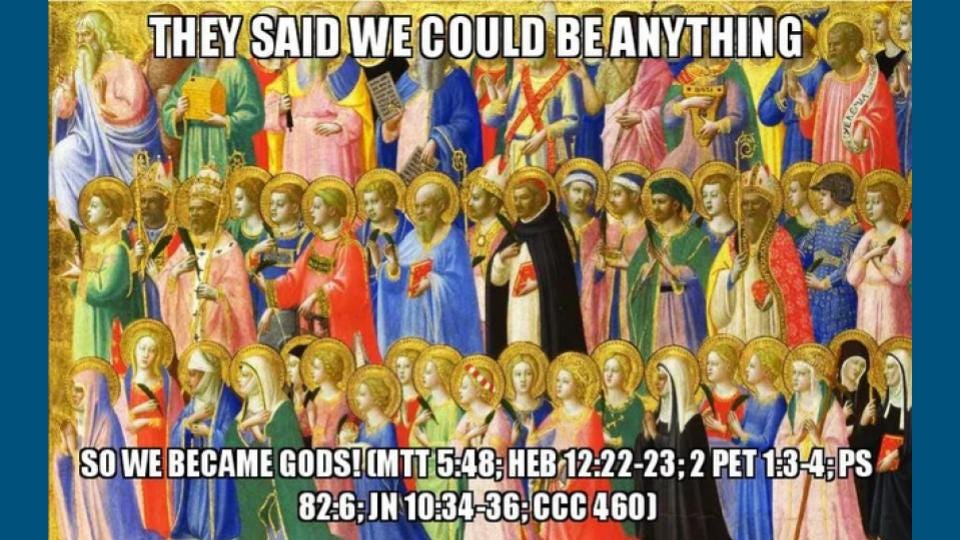C.S. Lewis on Theosis
Exploring the Doctrine of Deification (or Theosis) in Light of Christmas
The doctrine of deification (Latin) or theosis (Greek) states that God made humans originally in order to participate in His divine nature. In other words, human nature is not complete without God’s own Spirit breathing life into us and His power energizing us! Listen to St. Paul’s words in Philippians 2:12-13
“Work out your own salvation with fear and trembling, for God is energizing in you, both to will and to energize for his good pleasure.”1
God not only wanted Adam and Eve to cultivate His Creation and spread out into families and societies (See Genesis 1 & 2), but also to spiritually ascend into His own Divine Life. This divine plan was hijacked unfortunately by the Evil One, but thankfully has been restored through the Incarnation of Christ Jesus, our Lord, and made available to us through the sacramental life (in prayer, worship, baptism, communion, confession, etc.) St. Ireneaus of Lyons (a student of St. Polycarp who was mentored by the Apostle John) writes,
“He became what we are, so that we might become what He is.”
In Scripture, the word for God, Elohim, is sometimes used in the plural form in order to refer to angels and humans (Read Psalm 8:5 or Psalm 82: 6, “You [plural] are elohim”). This can confuse some students of Scripture. Isn’t there only one, true God who deserves our worship? Absolutely! There is only one Creator Who is uncreated. Everyone else is simply a creature who has come from His spoken Word. However, some creatures were made divine by God such as angels and humans and have the capacity to participate in His own Divine Nature. 2 Peter 1:3-4 states,
“His divine power has granted to us all things that pertain to life and godliness… that through these you may escape from the corruption that is in the world because of passion, and become partakers of the divine nature.”
Many of the Church Fathers will state, “God became a man in order to make men gods,” but perhaps a better way to translate this phrase into modern English would be: “Divinity became man in order to make men divine.” This translation helps the English speaker avoid being tempted by false ideologies such as pantheism, which states, “The universe is God,” or various heresies such as Mormonism, which states that “Jesus was a man who became God.”
C.S. Lewis really unpacks this idea of theosis throughout much of his writings. You can read my article from this past summer on this very topic below: “Why Your Mere Christianity Needs C.S. Lewis’ Robust Doctrine of Theosis.”
Lastly, there is no deification for Christians without fasting and embracing the ascetical life (giving up pleasures for the higher life). When we are too comfortable, we cannot follow Christ by picking up our crosses as He asks us to daily. In other words, “No Cross. No Glory!” I often like to say a much nerdier version of this phrase in the Greek: “No Kenosis. No Theosis!” Kenosis is a Greek word used in Philippians 2 that refers to Christ’s self-emptying in order to become one of us.
Frederica Mathewes-Green writes, “Grace is the presence of God, rather than something God dispenses. We say that God has an essence which is shared in common by Father, Son, and Spirit; but he also has “energies” by which he acts in the world, for example, filling the Burning Bush with fire. The destiny he intends for every human being is that we would likewise be filled with his fire / light / energy. “Energy” is a Greek New Testament word, energeia, which St. Paul used about 30 times (eg “God is energizing in you, both to will and to energize for his good pleasure,” Philippians 2:13). But when St. Jerome was translating the bible into Latin there was no good equivalent, so he used operatio and variants. For God to “operate” in the world is different from him “energizing,” being present in his own energies. So there was a subtle difference between Greek and Latin bible theology from the start. Western Christianity was built upon the foundation of the Latin translation, so some bible concepts are not as easy to grasp as in the East.” https://blogs.ancientfaith.com/frederica/writings/orthodoxy-and-catholicism


